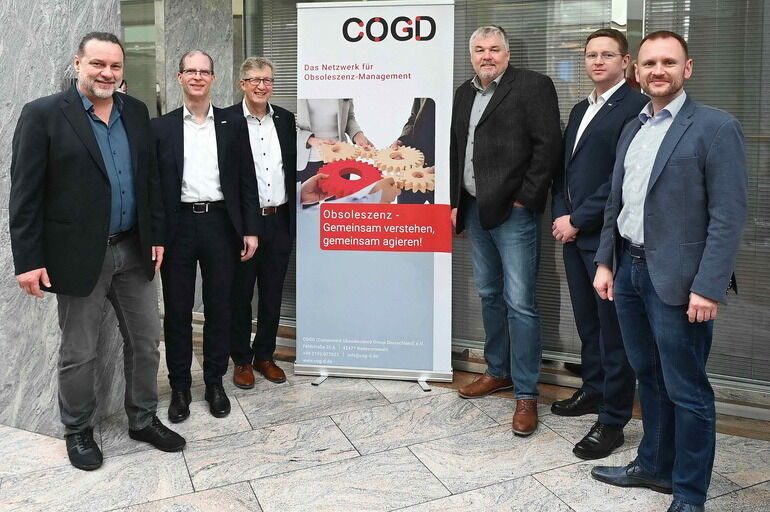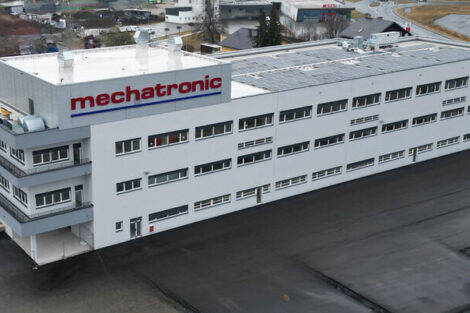In our highly technical world, if just one tiny electronic component suddenly becomes unavailable, it can cause enormous economic damage. As the list of potential weak points in a supply chain grows longer, this issue becomes all the more alarming. Experts estimate that commodities, materials, software, electronic components and other replacement parts discontinued at short notice or no longer available on the open market are costing industrial companies in Germany several billion euros per year.
This is something that greatly concerns non-profit industry organization COGD (Component Obsolescence Group Deutschland). For 18 years, the 163 members of the organization have been jointly developing strategies to minimize, or at least curb, the costly effects of obsolescence. The group’s efforts thusfar have been successful – as its recent initiative to internationalize the smartPCN standard into IEC 62402, as well as its cooperations with law firm ReachLaw, and other trade associations such as FED proves. Nonetheless, its eight recently-elected board members comprising new chairman Axel Wagner (Legal Manager, Prettl Electronics Automotive), his deputy Joachim Tosberg (Lifecycle Manager, RAFI Group), treasurer Oliver Hoffmann (Director EMEA, SiliconExpert Technologies), Dr. Wolfgang Heinbach (Partner, Syliom Management Consulting ), Tim Kohlen (Business Development Manager DACH, America II Europe), Stefanie Kölbl (Division Manager TQ-Embedded, TQ-Systems), Frank Mützner (After Series Manager, Plastic Omnium Lighting Systems) and Dieter Paatsch (Electronic Components Management, Festo) still have a lot of challenges to contend with.
Manufacturers in the automotive, aerospace, military, rail, power plant, medical and automation technology sectors, many of whom have required spare parts for their equipment and systems for decades, considered themselves in a good position in terms of supply security until the start of the Covid-19 pandemic. The various supply chain disruptions of the last three years have however taught them better. For COGD Chairman Axel Wagner, the realisation that materials and components required for production and maintenance are not always available in sufficient quantities at all times is better late than never.
“Unfortunately, some mistakes and omissions only become apparent in times of crisis,” he said. ”This is not necessarily tragic, as long as you learn from them. Unfortunately, the number of potential disruptive factors has never been as high as it is today. In a country like Germany, which is poor in raw materials and is currently completely dependent on foreign suppliers in many areas, it should have long been standard practice to continuously check all suppliers and supply chains for potential risks of failure and to take appropriate active and reactive precautionary measures. Unfortunately, this is still not the case. I assume that in just a few years, hardly any industrial company will be able to get by without strategic obsolescence management. But until then, we as an industry association still have a lot of educating and supporting to do.”
Deputy COGD Chairman Joachim Tosberg also emphasizes the increasing importance of comprehensive strategic obsolescence management for manufacturers. Obsolescence is not only caused by the discontinuation of electronic components, but also by a lack of raw materials and semi-finished products. Stricter environmental laws and regulations such as REACH also present difficulties. It is not only the SCIP database with a vast amount of product data that proves almost impossible to implement correctly. New measures including the German ‘supply chain law’ (Lieferkettengesetz) and the EU’s Digital Product Passport are already posing the next set of challenges, and their impact on supply security also needs to be examined intensively. Another cause for concern is the increasing shortage of qualified employees, the loss of knowledge due to age, outdated software components that are no longer maintained, and, above all, the issue of cyber security. “In view of these increasing potential obsolescence risks, it is now necessary to take preventive action quickly and more consistently than ever before,” Tosberg concludes, ”to develop forward-looking concepts that also ensure the availability of the required resources at all company levels in the long term.”
COGD offers companies and individuals affected by these issues extensive support in these areas. In addition to quarterly meetings featuring specialist presentations, reports from working groups and discussion groups, a variety of other platforms are available for the direct and indirect exchange of information on all aspects of obsolescence prevention and management. At this year‘s in-house exhibition on July 6 at the CongressForum Frankenthal, non-members will also have the opportunity to obtain information from 22 exhibitors about their services and products for obsolescence prevention. Detailed information on COGD can be found on the website: www.cog-d.de










